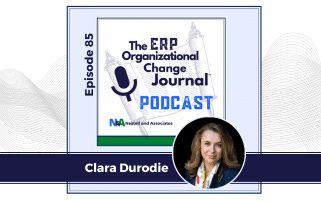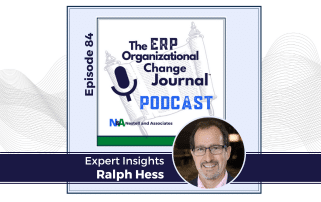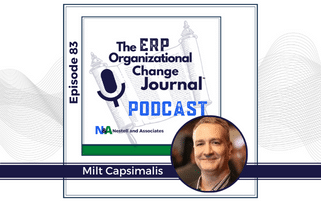“I am writing to shed light on the multifaceted challenges that organizations may face despite substantial investments and advancements in ERP systems.”
(If ERP Projects could talk….)
Dear CxO,
I trust this letter finds you well. As your upcoming ERP project, I look forward to challenging your leadership skills. My main point of this letter is that I hope you and the organization are well prepared.
As a substantial ERP project, and like my predecessors before me, I am demanding and have incredible influence, I will consume your organizational capital, and sometimes I am not very nice because as you know, “things happen”. And, chances are good that I will be taking you off guard and putting you in a position where you will have some explaining to do to your Board.
But you got this! Don’t worry about all the potentially serious business risks and challenges. Since the early 1990s, my ancestors have put some organizations through the wringer. Why be another unfavorable statistic if you can avoid it? I am going to throw every issue I can think of at you. You think you understand leadership, project management, technology, and business processes. Well, hang on. I am going to see just how good you are. I am going to test every ounce of your organizational wherewithal. Poorly validated data, frustrated stakeholders, organizational scapegoating, ERP training programs from hell, and project fallacy (budget and time over runs). Yep, the potential emotional outbreaks, employee frustrations, and hours of hard work.
If you, as an organization want to realize my full potential and be prepared to hire me, you’ll have to earn your stripes. As you and I begin to navigate the complex landscape of Enterprise Resource Planning (ERP) organizational change, I am writing to shed light on the multifaceted challenges that organizations may face despite substantial investments and advancements in ERP systems.
The Paradox of ERP Project Statistics
Within the ecosystem of ERP, the paradox persists – while investments in product enhancements and refined methodologies are substantial, the success rates of ERP organizational change are well, not spectacular. There is more than ample unbiased and objective evidence. The question that looms is why, despite impressive numbers, many organizations grapple with high implementation costs and prevalent failure rates.
Navigating ERP Project Success Factors
As your ERP project, I want to introduce you to my friends and professional colleagues at Nestell & Associates. They know how to make my life as an ERP project much less painful. For one, their collective experience, coupled with being leaders in objective ERP organizational change research, points to the critical role of organizational culture and transformational leadership in ERP organizational change success. My Nestell & Associates colleagues understand that the ERP landscape is adorned with numerous “success factors,” yet the challenge lies in organizations being aware of these nuances and assigning appropriate emphasis to each!
As part of formal training, ERP users must also gain insight into the “upstream” and “downstream” implications of business processes. In other words, they need to comprehend the origins and destinations of their data and the impact of their process execution on the organization as a whole. Additionally, employees should be equipped to identify and resolve issues, such as errors, transaction failures, or missing data. ERP functional training and corporate learning should become ingrained in users’ muscle memory so that it feels like second nature by the time of go-live, ensuring the success of Organizational Learning in ERP.
The Human Element in ERP Project Success
Contrary to conventional wisdom, ERP success is not solely dependent on technical proficiency or rigid adherence to business rules. The pivotal factor often lies in the soft skills as well, for example, corporate culture, communication, and leadership effectiveness. These intangible elements play a monumental role in shaping project outcomes. The leadership body of work in ERP organizational change is extensive. Leadership, especially in the context of ERP, is a fascinating topic that requires reflection. As I have explored the dynamics of ERP leadership, it becomes evident that effective leadership is not a simple concept but a combination of various factors, including emotional intelligence, adaptability, and understanding the human element. In fact, I would say that my ERP project predecessors before me, all have said there is a direct correlation between good executive leadership and the effectiveness and success of the entire ERP assimilation process.
The ERP Project Leadership Question
As we get ready to work together, I think that it is important that we get to know each other in advance. Reflecting on leadership styles and common denominators in successful ERP projects raises important questions. What do you think, is there a universal leadership style for successful ERP implementation, or does it vary based on organizational contexts? This is a bit of a quick question, but like I already mentioned above, I can be mean and a real pain in the backside. But, these questions underscore the complexity of leadership in the ERP landscape.
The Value of Leadership Reflection
Before we get too far into our project, and in the spirit of collaboration, I have been reflecting on leadership. In the pursuit of successful ERP organizational change, leadership reflection becomes paramount. Understanding the intricacies of leadership attributes, styles, and their impact on the human factor is essential for navigating the challenges inherent in ERP projects. As teammates, I have also been a bit introspective about the significance of teamwork in ERP organizational change success. My grandfather taught me that over the years, teamwork has really emerged as a critical success factor in ERP implementations. The relationship between organizational culture and teamwork plays a pivotal role in determining the success of ERP assimilation. Deliberate efforts to measure, promote, and encourage organizational teamwork are essential components of a successful ERP project.
Insights from ERP Research
Anyways, the ongoing ERP organization change research landscape continues to provide valuable insights into the factors influencing organizational change. Even recent studies on organizational culture, teamwork, and ERP success promises to contribute further to our understanding of the intricate dynamics at play. Over the years, my family tree has learned to appreciate and acknowledging ERP Organizational change researchers and practitioners. I extend my gratitude to ERP organizational change researchers for their valuable contributions. And, as practitioners, we must apply and share this knowledge to enhance the success of ERP initiatives.
From my experience, and reading what everyone has written about me over the years, the journey of ERP organizational change is a nuanced one, requiring a holistic approach that encompasses technology, processes, and most importantly, the human element. As we embark on this journey together, I encourage you to reach out to Nestell & Associates as they are true pioneers and practitioners (often imitated) in the field of “ERP Organizational Change”. They remain committed to providing strategic guidance and expertise to navigate the complexities of ERP implementations.
If we are both still here when the journey ends, let’s go have a beer. Cheers!
Best Regards,
Your ERP Project
Dr. Jack G. Nestell
Facing ERP project challenges?
Don’t navigate this journey alone. Reach out to our experts for tailored guidance and support. Let’s ensure your ERP project’s success together.
Related ERP Project Articles
ERP Achievement: The Elevator Pitch https://nestellassociates.com/erp-achievement-the-elevator-pitch/
ERP Go-Live Readiness Checklist https://nestellassociates.com/erp-go-live-readiness-checklist/
The Post Go-Live ERP Productivity Dip is a Reality https://nestellassociates.com/the-post-go-live-productivity-dip-is-a-reality/
The Latest Episodes
What is the Best ERP for Small Business?
ERP systems have long been associated with large businesses, but they can also be of great benefit to small businesses. The right ERP system can help a small business meet the demands of growth, including scalability and compliance with regulations. While there is no...
Trust in ERP Success: Key Themes for Private Equity
Within organizational change and leadership, trust emerges as a pivotal factor driving success. This article looks at the critical role trust plays in the realm of Private Equity ERP (Enterprise Resource Planning) initiatives. Through insightful analysis and research,...
The Impact of Leadership Emotional Intelligence on ERP Change
“But when I calculated the ratio of technical skills, IQ, and emotional intelligence as ingredients of excellent performance, emotional intelligence proved to be twice as important as the others for jobs at all levels.” (Goleman, 2011, Harvard Business Review)By Jack...
Related ERP Project Podcasts
Latest Episodes
Episode 85: Harnessing AI for ERP Innovation: Balancing Growth, Ethics, and Governance
In this episode, we explore AI in ERP. The impact of AI on ERP systems and organizational change, focusing on ethical implications, innovation, and governance. Our expert guest shares valuable insights on AI-driven transformation, risks, and best practices, providing...
Episode 84: Scaling Business Growth with Cloud ERP Solutions: Expert Insights
In this episode, we explore the power of cloud ERP solutions for driving business growth and scaling. We delve into industry-specific strategies that address common challenges and contribute to sustained expansion. Our expert guest Ralph Hess shares valuable insights...
Episode 83: Boosting ERP Efficiency with Autodesk Vault Integration
In this episode, we explore ERP Efficiency with Autodesk Vault Integration. In this episode we dive into ERP Efficiency with Autodesk Vault Integration. We look specifically at the challenges and solutions related to data management, automation, and integration in the...
About Nestell & Associates
Where People, Processes, and Technology Align
Nestell & Associates specializes in providing M&A ERP and IT consulting services for private equity firms and their portfolio companies. We offer a range of vendor-neutral services to support all stages of the investment cycle.
Moreover, we know how to effectively minimize or eliminate the issues you experience during M&A. With Private Equity Technology Solutions as 100% of our business, we bring a unique approach to ERP that other firms can’t compete with.







